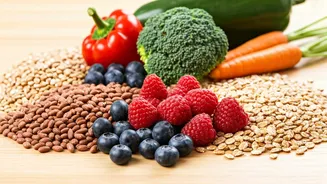Fiber's Gut Connection
Fiber plays a pivotal role in maintaining gut health. It acts as a prebiotic, nourishing the beneficial bacteria residing in the gut. This, in turn, supports
a healthy digestive system, which is essential for overall well-being. Fiber's presence aids in regulating bowel movements, preventing constipation and reducing the risk of conditions like diverticulitis. Adequate fiber intake can also contribute to weight management by promoting feelings of fullness, and it has been linked to a reduced risk of various chronic diseases. The US-based gastroenterologist's recommendations emphasize the significance of incorporating fiber-rich foods into the diet to bolster gut health and overall vitality. Fiber's impact extends beyond digestive health, influencing aspects such as blood sugar control and cholesterol levels. It's an indispensable component for a well-functioning body. By understanding fiber's role and choosing fiber-rich foods, individuals can proactively support their gut health and improve their long-term wellness.
Apples: A Fiber Powerhouse
Apples, a readily available fruit, are a noteworthy source of fiber, particularly soluble fiber, which forms a gel-like substance in the digestive tract. This gel slows down digestion, which helps regulate blood sugar levels and promotes satiety. Apples also contain pectin, a type of fiber that serves as a prebiotic, nourishing the beneficial gut bacteria and supporting a healthy microbiome. The gastroenterologist highlights apples as an easy and delicious way to increase fiber intake. Apples can be consumed whole, with the skin on for maximum fiber benefits, or added to salads and other dishes. Consuming apples regularly may help improve gut health and contribute to better overall health. The versatility of apples allows for their easy integration into various dietary plans, making them a convenient option for anyone looking to boost their fiber consumption. Choosing apples as a snack or incorporating them into meals provides a simple yet effective way to support digestive health and promote a balanced diet.
Berries: Fiber Rich & Tasty
Berries, including blueberries, raspberries, and strawberries, are celebrated for their rich fiber content and abundance of antioxidants. They provide both soluble and insoluble fiber, which contributes to overall gut health. The soluble fiber aids in slowing digestion and regulating blood sugar, while insoluble fiber adds bulk to the stool, promoting regular bowel movements. Berries also contain antioxidants that help protect the body from oxidative stress, further supporting overall health. The gastroenterologist's advice underscores the dual benefits of berries: boosting fiber intake and offering protective antioxidants. Including berries in your diet is a flavorful and nutritious choice. Whether enjoyed fresh, in smoothies, or as a topping for yogurt and oatmeal, berries offer a convenient way to enhance fiber consumption. The diverse range of berries allows for variety and ensures that the diet is never monotonous. Enjoying a variety of berries offers numerous health benefits and contributes to a balanced, fiber-rich diet.
Leafy Greens: High Fiber
Leafy green vegetables, such as spinach, kale, and collard greens, are excellent sources of insoluble fiber, which promotes regular bowel movements and prevents constipation. These greens also offer an array of vitamins, minerals, and antioxidants essential for overall health. The gastroenterologist emphasizes the significance of leafy greens, which provide multiple health benefits, with their high fiber content being particularly beneficial for the digestive system. Leafy greens can be consumed raw in salads, cooked as a side dish, or added to smoothies. Their versatility and nutritional value make them a staple in many diets. Regular consumption of leafy greens can contribute to improved gut health and offer numerous other health benefits. Their rich fiber content helps maintain a healthy digestive system, aiding in the prevention of various digestive issues. The ease of incorporating them into meals makes them a practical choice for boosting fiber intake and supporting overall wellness.
Legumes: Fiber & Protein
Legumes, including beans, lentils, and chickpeas, are a rich source of both soluble and insoluble fiber, as well as protein. They are a staple in many cuisines and provide a wealth of nutrients. Fiber in legumes supports healthy digestion and regular bowel movements, making them a cornerstone of gut health. The gastroenterologist recommends including legumes in the diet for their fiber and protein content, highlighting their role in promoting overall wellness. Legumes can be incorporated into meals in various ways: as part of soups, stews, or salads. They are also a sustainable food source, contributing to both environmental and personal health benefits. Consuming legumes enhances fiber intake and provides a significant protein source, making them a valuable component of a balanced diet. Their versatility and nutritional profile make them a beneficial addition for anyone seeking to support their gut health and overall vitality.





















